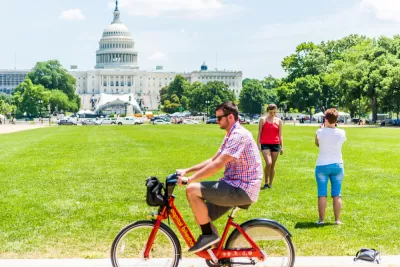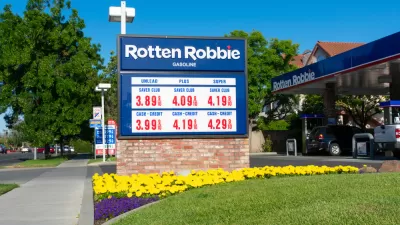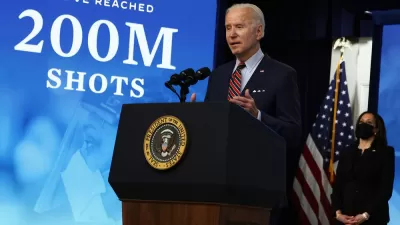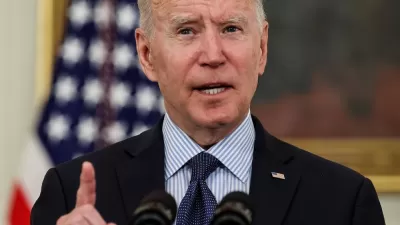In contrast to the $1.2 trillion Senate bipartisan infrastructure proposal, Senate Democrats are discussing a massive package that is more of a budget resolution than an infrastructure bill, designed to pass with 51 votes on reconciliation.

[Correspondent's note: This post also includes an update on the Senate's $1.2 trillion bipartisan infrastructure proposal which gained support as more details emerged.]
"A massive filibuster-proof budget reconciliation package worth as much as $6 trillion over a decade — of which half could be deficit-financed — is taking shape within the Senate Democratic caucus, according to a source familiar with the discussions," report Paul M. Krawzak, Niels Lesniewski, and Jessica Wehrman for Roll Call on June 17 (source article). "The $6 trillion total Senate Democrats are floating overshoots President Joe Biden's infrastructure and other plans by about $2 trillion."
As Planetizen posted last month, the Biden administration has since downsized the American Jobs Plan from $2.25 trillion to $1.7 trillion in an attempt to win Republican support.
Roll Call doesn't the Democratic partisan package an infrastructure proposal. They note that "[t]op Democrats like Budget Chairman Bernie Sanders, I-Vt., have said they plan to use the budget measure to add items not specifically included in Biden's budget, such as lowering the Medicare eligibility age to 60 and expanding the program's benefits to dental, vision and hearing coverage."
The Democratic plan was first reported by POLITICO, which does call it an infrastructure bill.
"According to a tentative plan, half of the proposed Democrats-only alternative would be paid for," reported Burgess Everett and Marianne LeVine on June 17.
About $2.5 trillion would go through the Finance Committee, $185 billion through the Energy Committee and almost $500 billion through the Environment and Public Works Committee, one source said, while emphasizing that the discussions are fluid.
A Roll Call podcast describes the Democratic's $6 trillion spending plan and "what this means for bipartisan talks on an infrastructure package and the path through reconciliation."
Support for bipartisan infrastructure plan grows
"The details of the bigger plan come as a bipartisan group of senators, led by Sens. Kyrsten Sinema (D-Ariz.) and Rob Portman (R-Ohio), released details this week of an infrastructure plan that costs about $973 billion over five years or $1.2 trillion over eight," add Everett and LeVine. Support for the Senate proposal has more than doubled from 10 to 21, gaining support from five Democrats and six Republicans. [CNBC lists all 21 Senators – see an earlier post for the 'original ten.'].
The plan would include $579 billion in new spending, and pay-fors include repurposing unused Covid relief funds, imposing a surcharge on electric vehicles, and expanding use of state and local funds for coronavirus relief.
Gas tax indexing
A footnote placed under "Index Gas Tax to Inflation" on the 2-page framework [pdf] states, "placeholder pending alternative non-tax offset from the Biden Administration." On June 18, the Associated Press reported that President Biden opposes the indexing, apparently unwilling to distinguish an index adjustment from a tax increase.
The National Conference of State Legislatures indicates that "22 states and Washington, D.C., have a variable-rate gas tax that adjusts, to some degree, with inflation or prices without regular legislative action. According to the Institute on Taxation and Economic Policy (ITEP), these states account for a majority of the nation’s population." ITEP advocates for what they call a "more sustainable, variable-rate designs where the tax rate is allowed to rise alongside gas prices, the general inflation rate in the economy, vehicle fuel efficiency, or other relevant factors."
Beyond transportation
The bipartisan funding plan goes beyond transportation (roads, bridges, passenger and freight rail, public transit, airports, ports and waterways, electric vehicles) to include broadband, power, drinking water pipes, water storage, abandoned wells and superfund sites. It includes $47.2 billion for "resiliency" which Roll Call describes as funds to "rebuild infrastructure to withstand the impact of severe weather events and other risks related to climate change."
Dual track approach
Emily Cochrane of The New York Times reports on June 17 that details for both the bipartisan and Democratic plans "remain in flux" and that they are not necessarily mutually exclusive.
For now, the divergent efforts are proceeding in parallel, with centrist senators in both parties pushing forward on their compromise proposal and Democrats preparing to use the fast-track budget process known as reconciliation to avoid a Republican filibuster of their far larger plan.
“The truth is both tracks are moving forward very well, and both tracks need each other,” said Senator Chuck Schumer of New York, the majority leader.
As it stands now, 11 Republican Senators support the more modest bipartisan plan. Sixty votes are needed to end a filibuster. With a Senate evenly split between Democrats and Republicans, surprises could happen if Senators place the country's infrastructure needs above party differences.
Related in Planetizen:
FULL STORY: Senate Democrats discussing roughly $6 trillion budget plan

Planetizen Federal Action Tracker
A weekly monitor of how Trump’s orders and actions are impacting planners and planning in America.

Congressman Proposes Bill to Rename DC Metro “Trump Train”
The Make Autorail Great Again Act would withhold federal funding to the system until the Washington Metropolitan Area Transit Authority (WMATA), rebrands as the Washington Metropolitan Authority for Greater Access (WMAGA).

DARTSpace Platform Streamlines Dallas TOD Application Process
The Dallas transit agency hopes a shorter permitting timeline will boost transit-oriented development around rail stations.

Renters Now Outnumber Homeowners in Over 200 US Suburbs
High housing costs in city centers and the new-found flexibility offered by remote work are pushing more renters to suburban areas.

The Tiny, Adorable $7,000 Car Turning Japan Onto EVs
The single seat Mibot charges from a regular plug as quickly as an iPad, and is about half the price of an average EV.

Supreme Court Ruling in Pipeline Case Guts Federal Environmental Law
The decision limits the scope of a federal law that mandates extensive environmental impact reviews of energy, infrastructure, and transportation projects.
Urban Design for Planners 1: Software Tools
This six-course series explores essential urban design concepts using open source software and equips planners with the tools they need to participate fully in the urban design process.
Planning for Universal Design
Learn the tools for implementing Universal Design in planning regulations.
Municipality of Princeton
Roanoke Valley-Alleghany Regional Commission
City of Mt Shasta
City of Camden Redevelopment Agency
City of Astoria
Transportation Research & Education Center (TREC) at Portland State University
US High Speed Rail Association
City of Camden Redevelopment Agency
Municipality of Princeton (NJ)





























